Virgil Dominic
"Ha riconosciuto il suo Destino,
e ha condiviso le sue fortune"
(He recognized his destiny
and shared its blessings.)Virgil was born in Oklahoma November 3, 1934. He has two older brothers, Leonard and Bob, both living in Texas.
Both his father (John) and his grandfather (Vincenzo) came to Northeast Ohio from Italy. They worked for Goodyear and lived in the Akron area. Once the Depression came, Goodyear was forced to make cut backs like most companies. They tried to keep the married men working. His grandfather was considered single because his wife was still in Italy and Virgil's father was still single at this time. The father-son team migrated to Oklahoma to work in the coal mines. It was in Oklahoma that Virgil's father, John, met Lucy, the woman he was to marry and who would become Virgil's mother. Later they would move to Cleveland even though Virgil's mom was concerned about the cold weather. 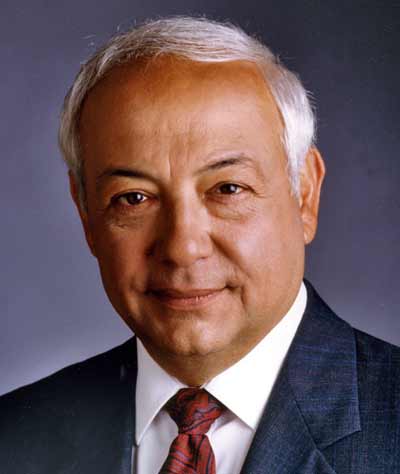
Virgil Dominic in his Channel 8 days
Virgil got his first job at 12 years old. "Italian parents believe you must protect the child, but expose them to the world of work." He worked in a little grocery store owned by another Italian who went to his church. "So I was working, but still my parents knew I was protected."Virgil's two brothers encouraged him greatly. "Back in those days, growing up in Oklahoma, the best job you could get was for the oil company." Both of his brothers went into the oil business and he went into television. "Of course my mother was concerned at first - she was afraid there was no job security in television." Virgil concedes that his mother was right - but it was his calling. He enjoyed it and knew it was where he belonged. His father told him that if this is what God intends for you, you will not fail. Later, his mother loved to watch him on television. "I think it was natural for immigrants to have their guard up and look for security. But my father told me 'go for it. See how good you are.'" "My father was the most learned man I ever met," says Virgil. "He never went beyond 6th grade and I have yet to meet a smarter man." Virgil describes his father as his most powerful teacher. "I can't remember a word of criticism. All I remember is how many times he told me he was proud of me or encouraged me." Virgil's relationship with his father was very special. His father was a railroad worker, offloading packages from the trains. When Virgil was at the University of Tulsa he would get off the air at midnight and every couple of weeks he would drive home to see his parents. He'd get in around 3 in the morning and his father worked over night. They would sit on the curb together and his father would always ask him what he learned that week and Virgil had to tell him something from each class he took. Virgil was a little worried one night and mentioned this to his father. He was about to graduate. Television had a lot of competition. He worried that he was not good enough or that he would not be able to make a living. His father put his arm around him and in Italian said 'Il Fortuno est Destino; Il Destino est Fortuno' (Your fortune is your destiny; your destiny is your fortune.) His father went on to explain that for every person born there is a path God has assigned. He told his son "You are going to walk that path. Don't worry. Do the best you can and the path will take over." Early on Virgil displayed a singing talent. "Of course it was the dream of every Italian parent that there son be the next Caruso." At great expense to them, Virgil's parents sent him to take singing lessons for the unheard of price of $3.00 a week. He sang in recitals and concerts up until he went to college. When he got to the University of Tulsa, he says, "I met people who could really sing and that was the end of that." Virgil has a philosophy that nothing is an accident - things happen for a reason. This was one example. He was now living in McAlister, Oklahoma. His teacher ran a small radio station and allowed the students to sing or read scripts on the air. He was 16 years old at the time. 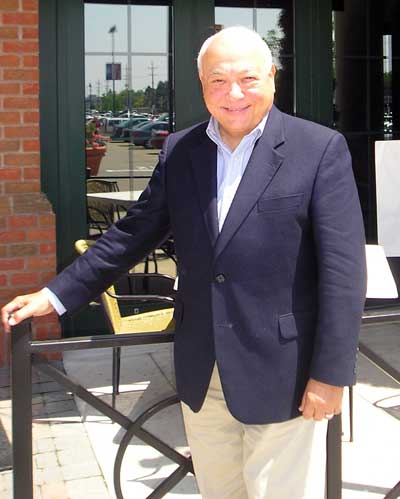
He was approached by the station owner who asked him if he ever considered going into radio. He said that he had not and the station manager suggested he come talk to him about the possibility. Virgil went and talked to the manager, got hired and instantly fell in love with radio. He loved every aspect of his new job - announcer, news man, commercials, DJ - every part. "Even back then it's funny to see how your life is being formed and prepared for the future without knowing it." The professional announcers at the station taught him the ropes and encouraged him throughout. "These lessons and demonstrations of supervisors being willing to help became my management style many years later. From there Virgil continued to work all through college where he majored in Radio and Television Journalism. He was still living in McAlister and going to The University of Tulsa, 120 miles away. Every Friday after school, he would hitchhike back to the radio station and be on the air by 6:00. He would work all 3 days of the weekend and then head back to school. "I had it made. My mother was doing the cooking and laundry and I was on the radio!" In his junior year in college, a larger market in Tulsa hired him for the four to midnight shift. "It was a wonderful experience and enabled me to pay for school. Look how blessed I was. I was getting paid. Getting an education. Loving my job and loving my family." Virgil considers it a privilege to be on the air and that with privilege came responsibility. At that time, there were only three stations and the audiences were huge. Virgil was also working in a shoe store. A lovely woman named Dottie Ann came into the store. He tried to sell her shoes but she let him know she was the niece of the owner and had no intention of paying for her shoes. Dottie Lynn was living in St. Louis. Virgil and Dottie Lynn started dating when he was only 16 but nothing really serious until junior year of college. Then in his senior year he graduated in June and got married in August (1956) and went into active duty in the Air Force the following year. Virgil's father had encouraged him to join the Air Force ROTC, which he did. He was stationed in Cheyenne, Wyoming and then Holloman Air Force Base in Alamogordo, New Mexico. It was 1957 - the beginning of the space age. Sputnik had just been launched and Virgil was working on a space base. He started out in supply and then became a public information officer - right back in his element. There was a German rocket scientist on the base. "I've been remarkably blessed. Most people I've met have been really, really nice to me. Here I am at 21 years old interviewing a German scientist concerning mathematics and rocket science. I remember once I told him I apologized for being so naïve and asking so many questions that must seem overly simple to him. He said to me "Virgil, let me tell you, never feel like you have to apologize. Ask me anything that will help you understand the message. We cannot do what you do. I am an expert in this field but I do not know how to communicate the thoughts so that people understand them." Virgil remembers those words to this day and they have always had an impact on him. He had no idea that someday he would be interviewing Presidents (Nixon and Reagan), Mayors and Governors. "I always remember what this German scientist said to me and it became the basis of my interviewing style." Virgil fell in love with the Air Force. He calls it a "thrilling, wonderful experience." He even considered a career in the Air Force and probably would have pursued it if he hadn't been exposed to "a wonderful television station in Oklahoma City." It was WKY TV, the NBC affiliate there. He had worked at the station for two months before he was called to active duty. "It was a short experience, but a wonderful one." He had grown up watching this station at home and knew they had a serious, respectful attitude toward the news. "I always wanted to be Ted Koppel!" he jokes. It was only lure of this television station that kept him from making the Air Force a permanent position. He was hired back at the station as soon as his military time was over. "I was so blessed yet again. Everything was even better than expected. The station was full of mentors." At that time, you had to undergo extensive training as a television journalist before they would consider letting you near a microphone. He was his own photographer, reporter, and producer. "In all categories someone took the time to mentor me and critique me in a helpful way. That is how I learned. No one ever once made me feel bad. Their feedback was pointed and important and I soaked up the lessons they were teaching." 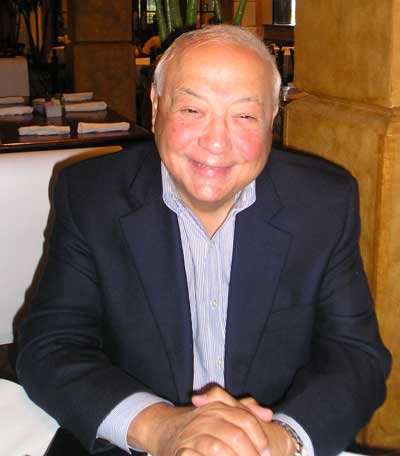
Virgil Dominic in 2007
Again, this was a lesson he took with him into management years later; criticisms should be helpful not hurtful, a lesson that always worked for him. Once he was trained, Virgil got the opportunity to anchor the news. He would go to work at 1:00, carrying sixty-five pounds of camera equipment. He would go out and film a story, come back to the station and write it. This was the day of film and on top of everything else; Virgil had to learn to process the film. Historically, the News Director always anchored the 6:00 news. The news director was accepting a position in Pittsburgh and asked Virgil to go with him. WKY countered with another offer. They said there was still someone with more seniority ahead of him for the 10:00 spot, but they offered him the opportunity to be the NBC correspondent and anchor the 6:00 news. At that time if the network wanted a story in Oklahoma, Texas, Missouri, Arkansas or Kansas, they would call WKY and Virgil would do the story. During the span of this assignment, Virgil appeared on Huntley-Brinkley, The Today Show and a lot of other national shows.
After seven years, a news correspondent NBC called him and asked him to come to Cleveland, Ohio to WKYC TV. He would be doing news at 6 and 11 and network stories. It was 1965 and Virgil Dominic came to Cleveland. He stayed on TV 3 as the main anchor for seven years. Contracts for on-air personalities were only for 26 weeks and could be cancelled after that for no reason. It was five years, 26 weeks at a time, before the stations started to realize the power of the anchor and gave them more money and extended contracts.
Looking back, Virgil also feels his Catholic education was a major influence on his life and the directions he chose. "I took quite literally the Gospel where Jesus gives three men talents [coins]. Two invested and increased the value of the talents. The third was so afraid of loosing the talents he buried them. I believe God gives us talents and we are meant to magnify and use those talents for His benefit - not ours." Virgil is concerned that people will think he is boastful when he talks about how blessed he is and how good his life is. He knows everyone has a time when he or she feel threatened or suffer a tragedy and his life is no exception. "I certainly never worried that my young wife would die. It was inconceivable. But the wonderful education of the nuns sustained me through this and other sadness in my career and personal life and I realize I truly am blessed." When Virgil came to WKYC he was thrilled to be at such a wonderful station. He was greeted by incredibly talented creative journalists. Many of the WKYC people were promoted to NBC positions giving WKYC the reputation of being a cauldron for NBC. A big breakthrough came when NBC started to create NBC radio news on the hour from Cleveland. Virgil was chosen to write, produce and narrate on the air. The show was heard all over the United States. "In retrospect I think this was done not for me, but for my dad. He hated when I left Oklahoma City and now he got to hear me every night on the news. Everyday when he got up his whole day was pointed to hearing me on the news. What a blessing for both of us." Virgil was then assigned as a newscaster on the Today Show whenever the regular newscaster was on vacation. "Barbara Walters could not have been nicer. She was really wonderful." Frank McGhee was the anchor then, another transplant from WKY in Oklahoma. It was getting to a point where Virgil knew he was about to realize his dream and go to network full time. Even trade papers like Variety were predicting Virgil would be the next Today Show Host. He also knew this would require a move to New York. Virgil was traveling to New York on a regular basis and found that all of the men he knew were pretty happy there. "Inevitably one of the wives would invite me out to the house for dinner with the family and when the opportunity came they would always say the same thing. Don't do it." Virgil says the wives warned him that the network was all-consuming and there was never any time for family. He knew personally that many of them ended up in divorce. At the time Virgil's daughter, Debbie was nine and his son Mark was a newborn. "There comes a certain point in a person's life when God takes over. People can say what they want - but I know it to be true. I was thinking about New York, but not pursuing it. I loved Cleveland. I loved my work. I loved WKYC. I loved NBC. People stopped me on the street and said Hi Virgil - always using my first name because we were like family. That always meant a lot to me. And then out of the blue I got a call from Atlanta, Georgia." Virgil goes on to explain that the ABC affiliate in Atlanta offered him an anchor position. He turned them down. They kept coming back with better and better offers. Finally, they flew Virgil and his wife to Atlanta, just to see the facility. "It was terrible. WKYC was professional and had all the bells and whistles. Atlanta had nothing." They offered him still more money and a five year contract. He talked to his wife and they prayed about it. He finally called and accepted the job but only if he could be News Director and anchor. "I don't know if it was confidence or stupidity, but I knew I could do it. I had done every discipline there was in the news room and I knew I could be news director and make something out of this station." So, in 1972, they moved to Atlanta. Virgil worked 17 hour days. He spent the budget on equipment, leaving no money left for reporters. He had no choice but to hire young, in-experienced people who would work without pay. Virgil had to become a trainer and a mentor. When they got off the air after the 6:00 news the entire staff would gather to hear what he thought of their work on that show and what they could do better. Every show became a lesson. "When someone is trying so hard you can't be angry. It is management's responsibility to appreciate and train the workers." WSB was the NBC affiliate in Atlanta and had been No. 1 in the ratings for 50 years. Within three years, Virgil and his station took over the number one spot because as he says, "these kids wanted to win so badly they would do anything. They were hungry to learn and succeed." Once again, fate stepped in. Because the station was now #1, the owner sold it. Virgil was not to be part of the new stations team. The General Manager of Channel 8 in Cleveland quickly offered him the job as News Director. "Now it was time fro me to decide. Did I want to be on air or management? I was 42 years old at this time and I decided I wanted management." Channel 8 was third in the ratings, but Virgil believed he could make a difference. With his hands-on, personal style of management, the station started getting better and better. "People needed a reason to change stations. Most people became comfortable with the news they watched and unless there was a reason to change, they didn't." The event that made the difference for Channel 8 was the unfortunate passing of Dorothy Fuldheim. "She was an absolute monument of Cleveland television. It was as if Dorothy gave viewers permission to look around. And they did." One of the first people to welcome him to Cleveland was Paul Sciria. Paul was a police reporter. Paul's father called him and told him to "look out for Virgil Dominic. He's a good man and a good Italian." Paul's father had seen him on Huntley Brinkley and knew he was coming to Cleveland. Professionally, Virgil was doing very well. Sadly, his personal life received a significant blow. After 22 years of happy marriage, Virgil's wife had a fatal heart attack. She was only 47 years old. Dottie Lynn had been such an important part of his life, and the mother of his children, Debbie and Mark, and he was devastated. He never expected to remarry, but eventually he did. He met a beautiful young schoolteacher named Shaun and they have now been married for almost twenty years. 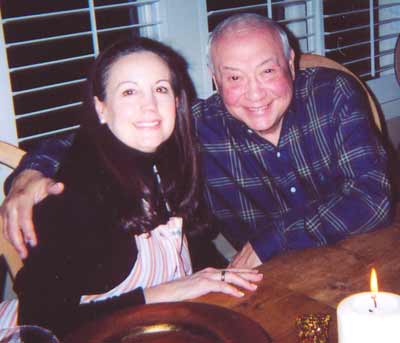
Virgil Dominic and wife Shaun
For the next 15 years, Channel 8 was number one in the ratings. Although he became General Manager, he still credits the stations success to the talented team working at the there. "I apparently had a gift for spotting talent. Some kind of feeling I would get about a person."One such example was Kelly O'Donnell, a Cleveland raised woman who attended Northwestern. Virgil hired her in her junior year of college. He saw that she was not very good on the air in the beginning but knew there was great potential, so he practiced with her over and over. It did not take long because, as Virgil says "She learned very quickly. She had strength of iron. She was a great writer and a great reporter and I loved to watch her blossom over time." When she covered the Lucasville prison riots he turned to his wife and said "I have just lost Kelly O'Donnell" and sure enough, she got a call from NBC. He would never have held her to her contract because he was always happy to see people advance and excel. He was General Manager by then and although he knew he would miss her it was "a great moment for both of us."
Virgil is responsible for starting the careers of many people in the business - something of which he is especially (and rightfully) proud. Stefani Schaefer, now in Orlando and soon to be in Chicago is one of his success stories. She left the local Cleveland market in 2006 to join a national show. 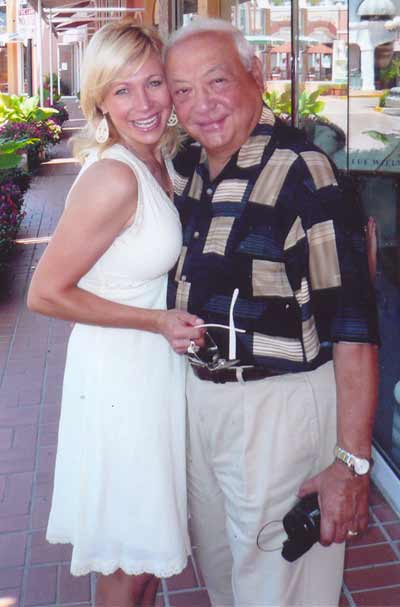
Stefani Schaefer and Virgil Dominic
In addition to Kelly O'Donnell, there is Martin Savage, Tom Meyer, Carl Monday and Denise Dufala to name a few. He remembers the people he worked alongside and competed against with great fondness. For example, here is some of what he had to say: Don Webster "Quite a gentleman and a very nice man." Howard Hoffman "Very personable man. Great singing voice and wonderful size". Ralph Tarsitano "Every summer Tarts would load me down with zucchini. He was such a talented man and so much fun to work with." Liz Richards "A great lady who overcame so many hard times." Fred Griffith "Now there's a real southern gentleman. Quite the professional." Wilma Smith: "Such a lady. She was always the best. I competed with her for years and then when there was a short window in her contract I was able to hire her. I was thrilled." He also worked with Wally Kinan ("The weatherman") and Jim Grainer on sports. When Virgil became General Manager, he was asked to do on-air editorials, something he was not comfortable doing. "This was difficult for me because I was raised as a journalist and as such I was trained not to offer opinions." So he did his editorials a little differently. He used them as a way of explaining the news in a little more detail than a standard newscast had time for. He would offer the "real story" behind the stories. Although, to this day, he is still uncomfortable giving opinions on news he feels now, as he did then, that there is a need for explanation and detail in some of the stories on the air. "How can someone understand Iraq or Social Security in a ten second sound byte?" He goes on, "No story is so complicated that it can't be explained with a little time." Things changed when Channel 8 was bought by Fox. "I hated to leave; it was like giving up part of my body. But it was time to go." Virgil describes leaving television as a tremendous loss and relied heavily on his very supportive wife, Shaun. Shaun was actually glad it happened because she was afraid she was going to lose Virgil to the stress. Unbeknownst to most people, CBS had been in bankruptcy for four years before Fox took over, so there where tremendous pressures on Virgil. Of course retiring from television did not mean Virgil was going to take it easy. He is consulting with CCC on a monthly cable show. He is involved with Classic TV Productions which produces programming for Sports Time Ohio (the Cleveland Indians cable channel), Fox Sports, Ohio News Network, and others. He also lectures at Akron University. 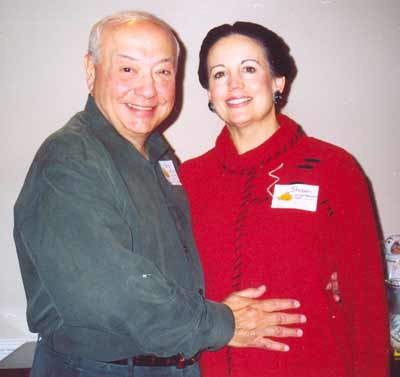
Virgil Dominic and wife Shaun
"I just can't kick back and say this is it. The calendar says I'm 72 - but I don't feel like it!" At the time of his retirement, the news staff consisted of Tim Taylor, Wilma Smith, Casey Coleman, Dick Goddard, Denise Dufala, Dick Russ and Lori Vick.He has a tremendous amount of admiration for today's newscasters. He calls the photographers and background people you never hear about "unsung heroes" because nothing would happen without them. "This was a different time," says Virgil. "When I was working if one station needed equipment the others would offer it. Of course there was competition, but there was still respect and admiration too." All these years later Virgil sees how true his fathers words to him were. So many plans he made did not work out; so many things unplanned worked out very well. "I now tell my children and all young people that when all is said and done you are going to walk the path. I believe it is a universal truth. It cannot be proven, except for the proof in our lives." 'Il Fortuno est Destino; Il Destino est Fortuno' Virgil's father died while Virgil was in Atlanta. Virgil's mother died when she was only 54 years old but had the opportunity to see Virgil's first child, Debbie before she died. Virgil's Catholic upbringing has had a tremendous influence on his life. The First Friday Club of Cleveland called Virgil about a year ago and asked him to speak. He wanted to talk about the people who affected his life - Catholic nuns and priests, his friends and of course his parents. "I was so blessed to have such loving parents." For the first time in his life, he had the chance and the reason to look back and realize what was happening. In hind site, he saw how everything led up to where he is today. This was a different speech than he was usually called on to do and he became very introspective about it. He wanted to make this speech his own tribute to the many who had led him down the right path. He remembers one wonderful priest who was an "amazing orator. He influenced me greatly on the power of words." He remembers how Sister. Mildred, Sister Emily and Father Higgins took time with him. "I always felt like my teachers loved me." Virgil is a member of five Halls of Fame: Cleveland Broadcasters Hall of Fame; Cleveland Press Club; Ohio Broadcasters Hall of Fame; Associated Press Hall of Fame and UPI Hall of Fame. 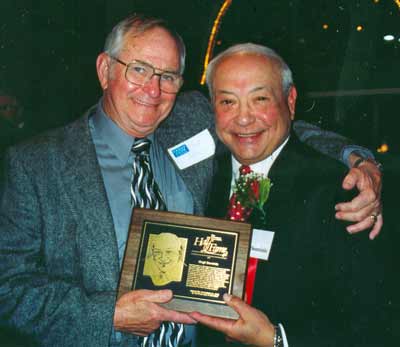
Cliff Adkins and Virgil Dominic at one of Virgil's Hall of Fame inductions. Cliff is Virgil's "oldest friend in broadcasting," a retired photographer from WKYC-TV3
He describes himself as a "news junkie", but is not altogether happy with some of the cable news shows. "Every time a guest speaker on Cable news starts to talk, the anchor interrupts or talks over them. Some shows actually devolve into a shouting match. Isn't it amazing that at this point in time we have devolved into shouting instead of educating?"He also notes that there was a different air of respect and decorum during his time with television news. "We would never have said "Bush". It would have always been Mr. Bush or President Bush. It didn't matter what you thought of a person, because no one was supposed to know what you thought. We always used a title of respect." Commercials used to be three thirty-second at one time at the most. "We didn't want people to have time to move. We were always trying to prove to the advertisers that their message was being heard." He is an avid sports fan - Indians, Cavs, Browns and Ohio State. "Sports helped my son and I bond." Virgil played basketball in high school because "There were only 13 in my graduating class and you only needed 5 for a basketball team." He loves Cleveland and wants to see Clevelanders get the recognition they deserve as kind, genuine people. "I wouldn't want to live anywhere else. The seasons are great; the scenery is beautiful and; the people are kind." Virgil and Shaun have two cats: "the absolute joy of Shaun's life - well mine too actually". One is a male named Mate and the other is a black and silver female Maine coon cat named Maggie. Both are 17 years old. Virgil misses his time on television, and mainly the people, but he is adapting well to "retirement". Shaun's definition of retirement is "Twice as much husband and half of the salary." He and Shaun love to travel, especially by car. They bring the cats with them, adding a littler box to the back. They enjoy their children and their three grandchildren. Virgil's daughter, Debbie has been married to Frank Lautenbach for twenty-five years. They have three children Denise, Kristen and Sarah. His son Mark is single. 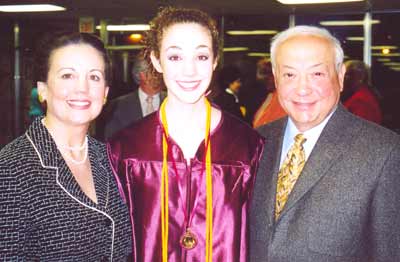
Virgil Dominic with wife Shaun and granddaughter Denise at Denise's graduation from Ohio State in June
"I am very blessed in so many ways. I have wonderful children and grandchildren. I married not one but two exceptional women. Shaun is such a good person and remarkably supportive. And I had such good, loving parents."There is no doubt that Virgil Dominic has been blessed, but there is more to him than the blessings. He had the wisdom to recognize the blessings, even during the hard times and the sad times. He recognizes the origins of his blessings and as such is a man directed by his faith. 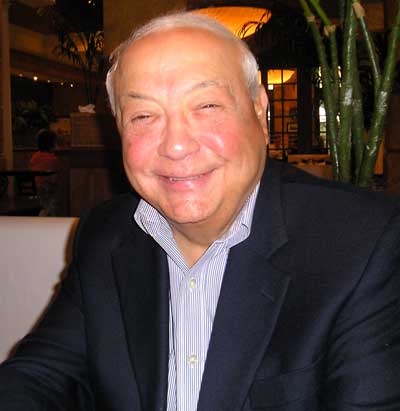
And he has shared his blessings with others. He is a man of honor and he is not ashamed in this modern world to stand up for decency, respect and principles. Yes, Virgil Dominic's destiny was blessed, but more importantly, "Ha riconosciuto il suo Destino, e ha condiviso le sue fortune" ( He recognized his destiny and shared its blessings.)
Profiled by Debbie Hanson (5/07)
Top of Page
Back to Profiles of Cleveland Seniors
|